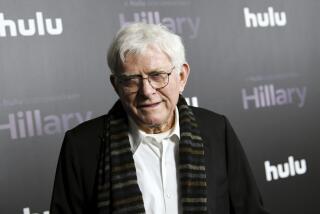Critic’s Choice: Interview special! ‘American Masters Podcast, ‘Hitchcock/Truffaut,’ ‘Blank on Blank’
The popularity of podcasts and the ease of making them has exponentially multiplied the hours of talk stored in the silos of our server farms. Even a midlevel comedian nowadays might leave a T. rex-sized audio footprint in the digital ether. (This is all sounding very sci-fi.) Just as we have flooded our collective digital memory with billions of images of everything light may reveal, so too are we stockpiling a conversational record of the present that’s unparalleled in history for size and triviality.
It isn’t new, to be sure. We have been putting a microphone up to life in one way or another since before “they all laughed when Edison recorded sound.” Most of it is, of course, disposable, whether or not it will ever be disposed of. But some of it is worth the look or listen, and older recordings may be more precious for coming from a time when the recorded record was sparser. The trick when raiding the archive is to find it, frame it, and put it where it might make a difference.
The PBS documentary series “American Masters,” which for 30 seasons has made a case for American arts high and low, has launched “The American Masters Digital Archive,” rummaging into its giant storage locker of old interviews originally mined for useful snippets and sound bites, but allowed to run at length here. (Run, old interview! Run free!)

There is a somewhat random video component, composed mostly of brief clips, as far as I can tell, and a more organized and substantial audio wing, “The American Masters Podcast,” whose episodes run upwards of 20 minutes. The first “season,” titled “Women on Women,” includes Gloria Steinem on Marilyn Monroe, Betty White on Carol Burnett, and the latest edition, in which Fran Drescher, Burnett and Doris Singleton triangulate Lucille Ball (whose 105th birthday would have been Aug. 6).
The Web-based PBS Digital Studios series “Blank on Blank” also makes use of old audio, with animator Patrick Smith building cartoons, usually five or six minutes long, from interviewers’ tapes and radio broadcasts. (HBO’s “The Ricky Gervais Show” did something similar with Gervais’ old radio show.) It is a clever way to get famous people, some of them no longer living, onto your website/YouTube channel. Each episode focuses on a topic (Kurt Cobain on identity, Grace Kelly on JFK). Recent editions include Marlene Dietrich on sex symbols, Frank Zappa on fads and a 20-year-old Bob Dylan telling lies about the six years he’d supposedly spent traveling with a carnival. (Interviewer Cynthia Gooding, doing some math: “Didn’t that interfere with your schooling?” Dylan: “I skipped a bunch of things.”)

Gail Levin directed the “American Masters” episode “Marilyn: Still Life,” for which she conducted the Steinem interview mentioned previously. Dedicated to Levin’s memory is Kent Jones’ “Hitchcock/Truffaut,” premiering Monday on HBO. This sprightly work is also founded on old tapes. The 1962 recordings, transcribed and edited, were the basis of François Truffaut’s 1966 book-length conversation with Alfred Hitchcock, in which the hot young French filmmaker deposed the venerable old British-American filmmaker film by film, raising him in the bargain from entertainer to auteur.
Jones’ documentary is at once the story of and a tribute to that influential volume, with commentary from Martin Scorsese, Wes Anderson, Richard Linklater, Olivier Assayas and others, and a kind of enactment of it. It brings the pages to life with clips and photos and the sound of the directors talking seriously and less seriously. The great Philippe Halsman photographed the summit. “We better not have cigars, otherwise it might make us look like movie directors,” you hear Hitchcock say, as Halsman poses them. “God forbid we ever look like that.”
On Twitter @LATimesTVLloyd
More to Read
The complete guide to home viewing
Get Screen Gab for everything about the TV shows and streaming movies everyone’s talking about.
You may occasionally receive promotional content from the Los Angeles Times.







